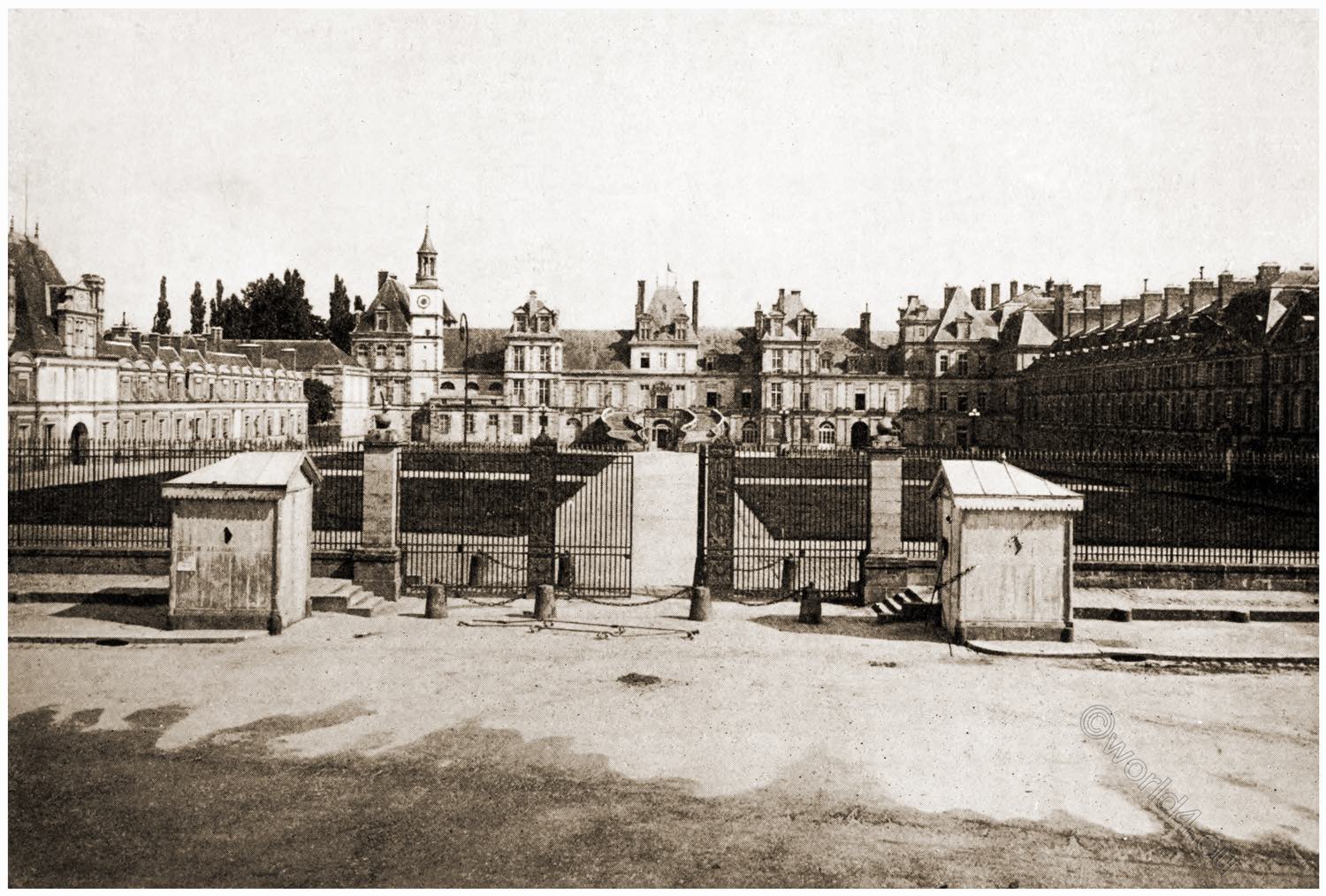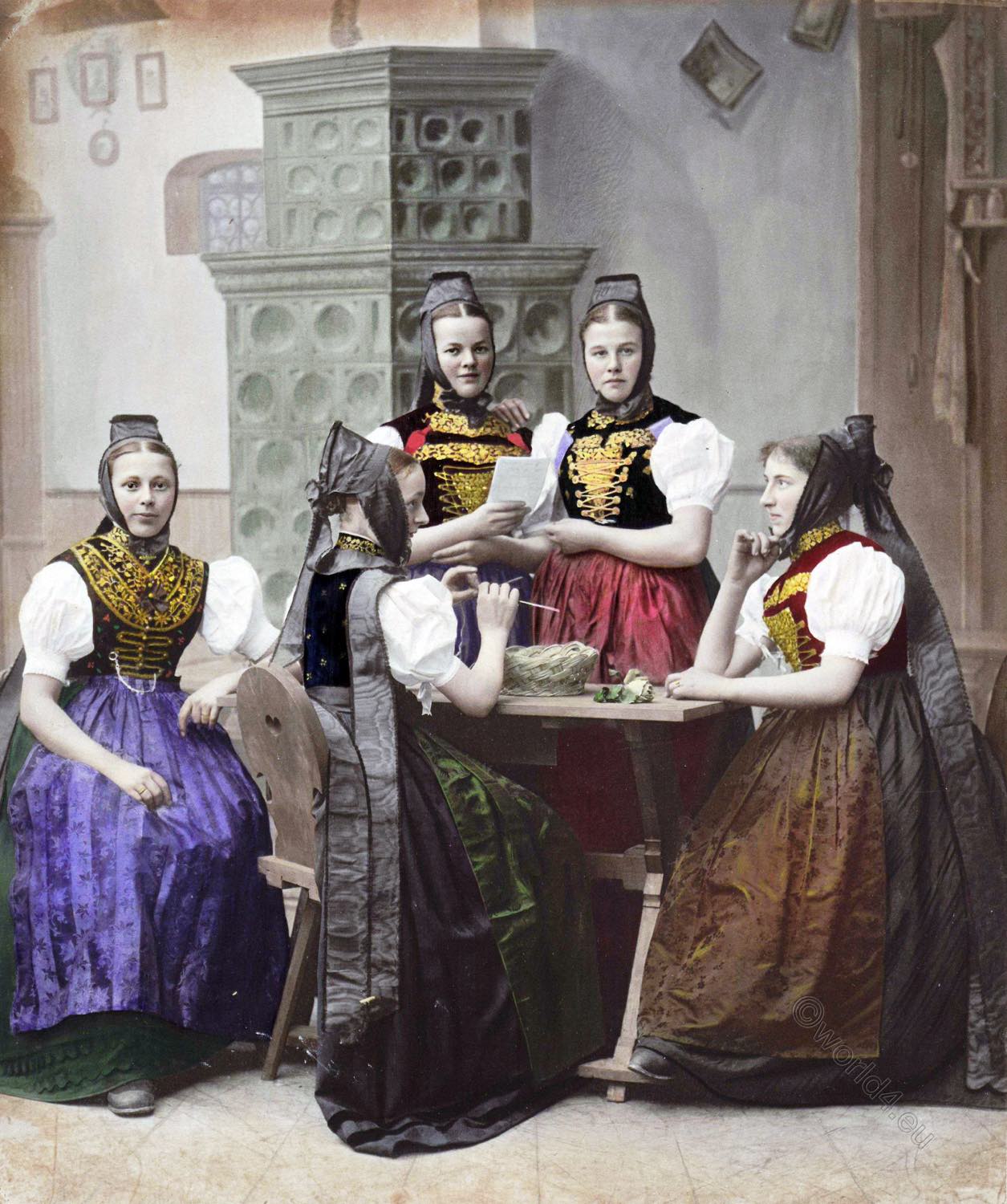CHAPTER XXXIV.
ROBIN HOOD OF SHERWOOD FOREST.
In this our spacious isle I think there is not one,
But he of ROBIN HOOD hath heard and Little John;
And to the end of time the tales shall ne'er be done
Of Scarlock, George a Green, and Much the miller's son,
Of Tuck, the merry friar, which many a sermon made
In praise of ROBIN HOOD, his outlaws and their trade.
DRAYTON.
EVERY reader of “Ivanhoe,” at the mention of Richard the Crusader, will be reminded of Robin Hood, the noble outlaw of Sherwood Forest, and his band of merry bowmen. With these we next concern ourselves, and if the reader will pardon the dry outlines of the historian before proceeding to the more interesting and imaginative story of the ballad-singer, we will at first state what so careful an antiquary as Mr. Ritson considers to be truly trustworthy in Robin Hood’s history.
Robin Hood was born at Locksley, in the county of Nottingham, in the reign of King Henry II, and about the year of Christ 1160. His extraction was noble, and his true name Robert Fitzooth, which vulgar pronunciation easily corrupted into Robin Hood. He is frequently styled, and commonly reputed to have been, Earl of Huntingdon; a title to which, in the latter part of his life at least, he actually appears to have had some sort of pretension.

In his youth he is reported to have been of a wild and extravagant disposition, insomuch that, his inheritance being consumed or forfeited by his excesses, and his person outlawed for debt, either from necessity or choice he sought an asylum in the woods and forests, with which immense tracts, especially in the northern part of the kingdom, were at that time covered.
Of these he chiefly affected Barnsdale, in Yorkshire; Sherwood in Nottinghamshire, and, according to some, Plompton Park in Cumberland. Here he either found or was afterwards joined by a number of persons in similar circumstances, who appear to have considered and obeyed him as their chief or leader… .
Having for a long series of years maintained a sort of independent sovereignty, and set kings, judges, and magistrates at defiance, a proclamation was published, offering a considerable reward for bringing him in either dead or alive; which, however, seems to have been productive of no greater success than former attempts for that purpose.
At length the infirmities of old age increasing upon him, and desirous to be relieved, in a fit of sickness, by being let blood, he applied for that purpose to the prioress of Kirkley nunnery in Yorkshire, his relative (women, and particularly religious women, being in those times somewhat better skilled in surgery than the sex is at present), by whom he was treacherously suffered to bleed to death.
This event happened on the 18th November, 1247, being the thirty-first year of King Henry III.; and if the date assigned to his birth be correct, about the eighty-seventh year of his age. He was interred under some trees at a short distance from the house; a stone being placed over his grave, with an inscription to his memory.
There are some who will have it that Robin Hood was not alive in the reign of Richard I., and who will have it that he preferred other forests to Sherwood. But the stories that we have chosen are of the Robin Hood of Sherwood Forest and of King Richard the Lion-hearted.
LITTLE JOHN.
The lieutenant of Robin Hood’s band was named Little John, not so much from his smallness in stature (for he was seven feet high and more), as for a reason which I shall tell later. And the manner in which Robin Hood, to whom he was very dear, met him was this.
Robin Hood on one occasion being hunting with his men and finding the sport to be poor, said: “We have had no sport now for some time. So I go abroad alone. And if I should fall into any peril whence I cannot escape I will blow my horn that ye may know of it and bear me aid.” And with that he bade them adieu and departed alone, having with him his bow and the arrows in his quiver. And passing shortly over a brook by a long bridge he met at the middle a stranger. And neither of the two would give way to the other. And Robin Hood being angry fitted an arrow to his bow and made ready to fire. “Truly,” said the stranger at this, “thou art a fine fellow that you must draw your long bow on me who have but a staff by me.” “That is just truly,” said Robin; “and so I will lay by my bow and get me a staff to try if your deeds be as good as your words.” And with that he went into a thicket and chose him a small ground oak for a staff and returned to the stranger.
“Now,” said he, “I am a match for you, so let us play upon this bridge, and if one should fall in the stream the other will have the victory.” “With all my heart,” said the stranger; “I shall not be the first to give out.”
And with that they began to make great play with their staves. And Robin Hood first struck the stranger such a blow as warmed all his blood, and from that they rattled their sticks as though they had been threshing corn. And finally the stranger gave Robin such a crack on his crown that he broke his head and the blood flowed.
But this only urged him the more, so that he attacked the stranger with such vigour that he had like to have made an end of him. But he growing into a fury finally fetched him such a blow that he tumbled him from the bridge into the brook. Whereat the stranger laughed loudly and long, and cried out to him, “Where art thou now, I prythee, my good fellow?” And Robin replied, “Thou art truly a brave soul, and I will have no more to do with thee to-day; so our battle is at an end, and I must allow that thou hast won the day.”
And then wading to the bank he pulled out his horn and blew a blast on it so that the echoes flew throughout the valley. And at that came fifty bold bowmen out of the wood, all clad in green, and they made for Robin Hood, and said William Stukely, “What is the matter, my master? You are wet to the skin?” “Truly, nothing is the matter,” said Robin, “but that the lad on the bridge has tumbled me into the stream.” And on that the archers would have seized the stranger to duck him as well, but Robin Hood forbade them. “No one shall harm thee, friend,” said he. “These are all my bowmen, threescore and nine, and if you will be one of us you shall straightway have my livery and accoutrements, fit for a man. What say you?” “With all my heart,” said the stranger; “here is my hand on it. My name is John Little, and I will be a good man and true to you.” “His name shall be changed,” said William Stukely on this. “We will call him Little John, and I will be his godfather.”
So they fetched a pair of fat does and some humming strong ale, and there they christened their babe Little John, for he was seven feet high and an ell round at his waist.
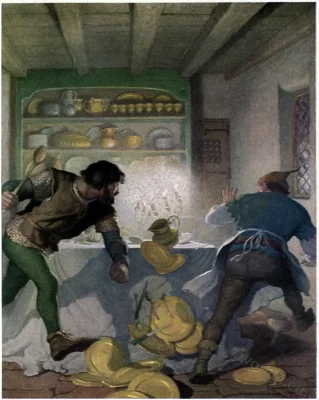
FRIAR TUCK.
Now Robin Hood had instituted a day of mirth for himself and all his companions, and wagers were laid amongst them who should exceed at this exercise and who at that; some did contend who should jump farthest, some who should throw the bar, some who should be swiftest afoot in a race five miles in length; others there were with which Little John was most delighted, who did strive which of them should draw the strongest bow, and be the best marksman.
“Let me see,” said Little John, “which of you can kill a buck, and who can kill a doe, and who is he can kill a hart, being distant from it by the space of five hundred feet.” With that, Robin Hood going before them, they went directly to the forest, where they found good store of game feeding before them.
William Scarlock, that drew the strongest bow of them all, did kill a buck, and Little John made choice of a barren fat doe, and the well-directed arrow did enter in the very heart of it; and Midge, the miller’s son, did kill a hart above five hundred feet distant from him.
The hart falling, Robin Hood stroked him gently on the shoulder, and said unto him, “God’s blessing on thy heart, I will ride five hundred miles to find a match for thee.” William Scarlock, hearing him speak these words, smiled and said unto him, “Master, what needs that? Here is a Curtal Friar* not far off, that for a hundred pound will shoot at what distance yourself will propound, either with Midge or with yourself. An experienced man he is, and will draw a bow with great strength; he will shoot with yourself, and with all the men you have, one after another.”
*) “The Curtal Friar,” Dr. Stukely says, “is Cordelier, from the cord or rope which they wore round their waist, to whip themselves with. They were,” adds he, “of the Franciscan order. Our Friar, however, is undoubtedly so called from his Curtal dogs, or curs, as we now say.” Thoms. Early Prose Romances: in which, by the way, may be found many of the tales of Robin Hood printed here, and much more besides of interest.
“Sayest thou so, Scarlock?” replied Robin Hood. “By the grace of God I will neither eat nor drink till I see this Friar thou dost speak of.” And having prepared himself for his journey, he took Little John and fifty of his best archers with him, whom he bestowed in a convenient place, as he himself thought fitting. This being done, he ran down into the dale, where he found the Curtal Friar walking by the water side. He no sooner espied him, but presently he took unto him his broadsword and buckler, and put on his head a steel bonnet.
The Friar, not knowing who he was, or for what intent he came, did presently arm himself to encounter with him. Robin Hood, coming near unto him, alighted from his horse, which he tied to a thorn that grew hard by, and looking wistfully on the Friar, said unto him, “Carry me over the water, thou Curtal Friar, or else thy life lies at the stake.”
The Friar made no more ado, but took up Robin Hood and carried him on his back; deep water he did stride; he spake not so much as one word to him, but having carried him over, he gently laid him down on the side of the bank; which being done, the Friar said to Robin Hood, “It is now thy turn; therefore carry me over the water, thou bold fellow, or sure I shall make thee repent it.”
Robin Hood, to requite the courtesy, took the Friar on his back, and not speaking the least word to him, carried him over the water, and laid him gently down on the side of the bank; and turning to him, he spake unto him as at first, and bade him carry him over the water once more, or he should answer it with the forfeit of his life. The Friar in a smiling manner took him up, and spake not a word till he came in the midst of the stream, when, being up to the middle and higher, he did shake him from off his shoulders, and said unto him, “Now choose thee, bold fellow, whether thou wilt sink or swim.”
Robin Hood, being soundly washed, got him up on his feet, and prostrating himself, did swim to a bush of broom on the other side of the bank; and the Friar swam to a willow tree which was not far from it. Then Robin Hood, taking his bow in his hand, and one of his best arrows, did shoot at the Friar, which the Friar received in his buckler of steel, and said unto him, “Shoot on, thou bold fellow; if thou shootest at me a whole summer’s day I will stand your mark still.”
“That will I,” said Robin Hood, and shot arrow after arrow at him, until he had not an arrow left in his quiver. He then laid down his bow, and drew out his sword, which but two days before had been the death of three men. Now hand to hand they went with sword and buckler; the steel buckler defends whatsoever blow is given; sometimes they make at the head, sometimes at the foot, sometimes at the side; sometimes they strike directly down, sometimes they falsify their blows, and come in foot and arm, with a free thrust at the body; and being ashamed that so long they exercise their unprofitable valour and cannot hurt one another, they multiply their blows, they hack, they hew, they slash, they foam. At last Robin Hood desired the Friar to hold his hand, and to give him leave to blow his horn.
“Thou wantest breath to sound it,” said the Friar; “take thee a little respite, for we have been five hours at it by the Fountain Abbey clock.” Robin Hood took his horn from his side, and having sounded it three times, behold where fifty lusty men, with their bended bows, came to his assistance.
The Friar, wondering at it, “Whose men,” said he, “be these?” “They are mine,” said Robin Hood; “what is that to thee?” “False loon,” said the Friar; and making a little pause, he desired Robin Hood to show him the same courtesy which he gave him. “What is that?” said Robin Hood. “Thou soundest thy horn three times,” said the Friar; “let me now but whistle three times.” “Ay, with all my heart,” said Robin Hood; “I were to blame if I should deny thee that courtesy.”
With that the Friar set his fist to his mouth, and whistled three times so shrilly that the place echoed again with it; and behold three and fifty fair ban-dogs (their hair rising on their back, betokening their rage), were almost on the backs of Robin Hood and his companions. “Here is for every one of thy men a dog,” said the Friar, “and two for thee.” “That is foul play,” said Robin Hood.
He had scarce spoken that word but two dogs came upon him at once, one before, another behind him, who, although they could not touch his flesh (his sword had made so swift a despatch of them), yet they tore his coat into two pieces. By this time the men had so laid about them that the dogs began to fly back, and their fury to languish into barking.
Little John did so bestir himself, that the Curtal Friar, admiring at his courage and his nimbleness, did ask him who he was. He made him answer, “I will tell the truth, and not lie. I am he who is called Little John, and de belong to Robin Hood, who hath fought with thee this day, five hours together; and if thou wilt not submit unto him, this arrow shall make thee.” The Friar, perceiving how much he was overpowered, and that it was impossible for him to deal with so many at once, did come to composition with Robin Hood. And the articles of agreement were these: That the Friar should abandon Fountain Dale and Fountain Abbey, and should live with Robin Hood, at his place not far from Nottingham, where for saying of mass, he should receive a noble for every Sunday through out the year, and for saying mass on every holy day, a new change of garment.
The Friar, contented with these conditions, did seal the agreement. And thus by the courage of Robin Hood and his yeomen, he was enforced at the last to submit, having for seven long years kept Fountain Dale, not all the power thereabouts being able to bring him on his knees.
But Friar Tuck was the only man of the clergy with whom Robin had friendly dealings. As a rule these churchmen fared as did the Bishop of Hereford in the following ballad, which we add for the sake of an example of the manner in which this True History of Robin Hood has come down to us from the year 1245:
THE BISHOP OF HEREFORD’S ENTERTAINMENT BY ROBIN HOOD AND LITTLE JOHN AND THEIR COMPANY IN MERRY BARNSDALE.
SOME they will talk of bold Robin Hood,
And some of barons bold;
But I’ll tell you how he served the Bishop of Hereford,
When he robbed him of his gold.
As it befell in merry Barnsdale,
All under the greenwood tree,
The Bishop of Hereford was to come by,
With all his company.
“Come, kill me a venison,” said bold Robin Hood,
“And dress it by the highway side,
And we will watch the bishop narrowly,
Lest some other way he should ride.”
Robin Hood dressed himself in shepherd’s attire,
With six of his men also,
And, when the Bishop of Hereford came by,
They about the fire did go.
“O, what is the matter?” then said the bishop,
“Or for whom do you make this ado?
Or why do you kill the king’s ven’son,
When your company is so few?”
“We are shepherds,” said bold Robin Hood,
“And we keep sheep all the year;
And we are disposed to be merry this day,
And to kill of the king’s fat deer.”
“You are brave fellows,” said the bishop,
“And the king of your doings shall know;
Therefore make haste, and come along with me,
For before the king you shall go.”
“O pardon, O pardon,” said bold Robin Hood,
“O pardon, I thee pray;
For it becomes not your lordship’s coat
To take so many lives away.”
“No pardon, no pardon,” said the bishop,
“No pardon I thee owe;
Therefore make haste, and come along with me,
For before the king you shall go.”
Then Robin he set his back against a tree,
And his foot against a thorn,
And from underneath his shepherd’s coat
He pulled out a bugle horn.
He put the little end to his mouth,
And a loud blast did he blow,
Till threescore and ten of bold Robin’s men
Came running all in a row:
All making obeisance to bold Robin Hood;
‘Twas a comely sight for to see.
“What is the matter, master,” said Little John,
“That you blow so lustily?”
“O here is the Bishop of Hereford,
And no pardon we shall have.”
“Cut off his head, master,” said Little John,
“And throw him into his grave.”
“O pardon, O pardon,” said the bishop,
“O pardon, I thee pray;
For if I had known it had been you,
I’d have gone some other way.”
“No pardon, no pardon,” said bold Robin Hood,
“No pardon I thee owe;
Therefore make haste, and come along with me,
For to merry Barnsdale you shall go.”
Then Robin he took the bishop by the hand,
And led him to merry Barnsdale;
He made him stay and sup with him that night,
And to drink wine, beer, and ale.
“Call in a reckoning,” said the bishop,
“For methinks it grows wondrous high.”
“Send me your purse, master,” said Little John,
“And I’ll tell you bye and bye.”
Then Little John took the bishop’s cloak,
And spread it upon the ground,
And out of the bishop’s portmantua
He told three hundred pound.
“Here’s money enough, master,” said Little John,
“And a comely sight ’tis to see;
It makes me in charity with the bishop,
Though he heartily loveth not me.”
Robin Hood took the bishop by the hand,
And he caused the music to play;
And he made the old bishop to dance in his boots,
And glad to get so away.
CHAPTER XXXV.
ROBIN HOOD AND HIS ADVENTURES.
“They say he is already in the forest of Arden, and a many merry men with him; and there they live like the old Robin Hood of England… and fleet the time carelessly as they did in the golden world.”- AS YOU LIKE IT.
AS has been already said, some of the ballad makers have so far erred from the truth as to represent Robin Hood as being outlawed by Henry VIII., and several stories are told of Queen Katherine’s interceding with her husband for the pardon of the bold outlaw. However this may be, it is known that Robin Hood once shot a match on the queen’s side against the king’s archers, and here is the story:-
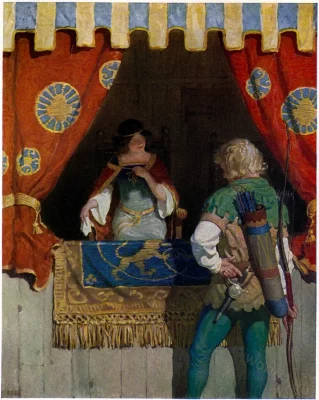
This seems to have been the opinion of the author from whom we draw the following account of our hero’s life,- to show how the doctors will disagree even on a topic as important as Robin Hood:-
THE NOBLE BIRTH AND THE ACHIEVEMENTS OF ROBIN HOOD.
“Robin Hood was descended from the noble family of the Earl of Huntingdon, and being outlawed by Henry VIII. for many extravagancies and outrages he had committed, he did draw together a company of such bold and licentious persons as himself, who lived for the most part on robberies committed in or near unto Sherwood Forest in Nottinghamshire. He had these always ready at his command, so that if need did require he at the winding of his horn would have fifty or more of them in readiness to assist him. He whom he most affected was called Little John by reason of his low stature, though not inferior to any of them in strength of body and stoutness of spirit. He would not entertain any into his service whom he had not first fought with himself and made sufficient trial of his courage and dexterity how to use his weapons, which was the reason that oftentimes he came home hurt and beaten as he was; which was nevertheless no occasion of the diminution of his love to the person whom he fought with, for ever afterwards he would be the more familiar with him, and better respect him for it. Many petitions were referred to the king for a pardon for him, which the king (understanding of the many mad pranks he and his associates played) would give no ear unto; but being attended with a considerable guard, did make a progress himself to find him out and bring him to condign punishment. At last, by the means and mediation of Queen Katherine the king’s wrath was qualified, and his pardon sealed, and he spent his old age in peace, at a house of his own, not far from Nottingham, being generally beloved and respected by all.”
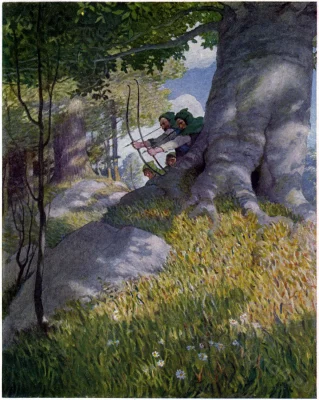
Robin Hood on one occasion sent a present to Queen Katherine with which she was so pleased that she swore she would be a friend to the noble outlaw as long as she might live. So one day the queen went to her chamber and called to her a page of her company and bade him make haste and prepare to ride to Nottinghamshire to find Robin Hood in Sherwood Forest; for the queen had made a match with the king, her archers against his archers, and the queen proposed to have Robin Hood and his band to shoot on her side against the king’s archers.
Now as for the page, he started for Nottingham and posted all the way, and inquired on the road for Robin Hood, where he might be, but he could not find any one who could let him know exactly. So he took up his quarters at an inn at Nottingham. And in the room of the inn he sat him down and called for a bottle of Rhenish wine, and he drank the queen’s health out of it. Now at his side was sitting a yeoman of the country, clad in Lincoln green, with a long bow in his hand. And he turned to the page and asked him, “What is thy business, my sweet boy, so far in the north country, for methinks you must come from London?” So then the page told him that it was his business to find Robin Hood the outlaw, and for that he asked every yeoman that he met. And he asked his friend if he knew anything which might help him. “Truly,” said the yeoman, “that I do. And if you will get to horse early to-morrow morning I will show you Robin Hood and all his gay yeomen.”
So the next morning they got them to horse and rode out into the forest, and the yeoman brought the page to where were Robin Hood and his yeomen. And the page fell down on his knee and said to Robin Hood, “Queen Katherine greets you well by me, and hath sent you this ring as a token. She bids you post up to London town, for that there shall be some sport there in which she has a mind you shall have a hand.” And at this Robin took off his mantle of Lincoln green from his back and sent it by the page to Queen Katherine with a promise that he and his band would follow him as soon as they might.
So Robin Hood clothed all his men in Lincoln green and himself in scarlet, and each man wore a black hat with a white feather stuck therein. And thus Robin Hood and his band came up to London. And Robin fell down on his knees before the queen, and she bade him welcome with all his band. For the match between the queen’s archers and the king’s was to come off the next day in Finsbury fields.
Here first came the king’s archers marching with bold bearing, and then came Robin Hood and his archers for the queen. And they laid out the marks there. And the king laid a wager with the queen on the shooting. Now the wager was three hundred tun of Rhenish, and three hundred tun of good English beer, and three hundred fat harts. So then the queen asked if there were any knights with the king who would take her side. But they were unwilling, for said they, “How shall we bet on these men whom we have never seen, when we know Clifton and the rest of the king’s archers, and have seen them shoot?” Now this Clifton was one of the king’s archers and a great boaster. And when he had reached the shooting field he had cried out, “Measure no marks for us, my lord the king, for we will shoot at the sun and moon.” But for all that Robin Hood beat him at the shooting. And the queen asked the Bishop of Herefordshire to back her archers. But he swore by his mitre that he would not bet a single penny on the queen’s archers for he knew them not. “What will you bet against them,” asked Robin Hood at this, “since you think our shooting is the worse?” “Truly,” said the bishop, “I will bet all the money that may be in my purse,” and he pulled it up from where it hung at his side. “What is in your purse?” asked Robin Hood. And the bishop tossed it down on the ground saying, “Fifteen rose-nobles, and that’s an hundred pound.” So Robin Hood tossed out a bag beside the bishop’s purse on the green.
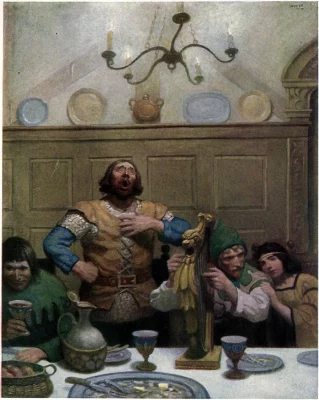
And with that they began shooting, and shot three bouts and they came out even; the king’s and the queen’s. “The next three shots,” said the king, “shall pay for all.” And so the king’s archers shot, and then Robin Hood, and Little John and Midge the miller’s son shot for the queen, and came every man of them nearer the prick in the willow wand than did any of the king’s men. So the queen’s archers having beaten, Queen Katherine asked a boon of the king, and he granted it. “Give me, I pray you,” said the queen, “safe conduct for the archers of my party to come and to go home and to stay in London here some time to enjoy themselves.” “I grant it,” said the king. “Then you are welcome, Robin Hood,” said the queen, “and so is Little John and Midge the miller’s son and every one of you.” “Is this Robin Hood?” asked the king, “for I had heard that he was killed in a quarrel in the north country.” And the bishop too asked, “Is this Robin Hood? If I had known that I would not have bet a penny with him. He took me one Saturday evening and bound me fast to a tree, and there he made me sing a mass for him and his yeomanry about.” “Well, if I did,” said Robin Hood, “surely I needed all the masses that I might get for my soul.” And with that he and his yeomanry departed, and when their safe conduct was expired they journeyed north again to Sherwood Forest.
ROBIN HOOD AND THE BEGGAR.
But Robin Hood, once having supplied himself with good store of money, which he had gotten of the sheriff of Nottingham, bought him a stout gelding, and riding on him one day towards Nottingham, it was his fortune to meet with a poor beggar. Robin Hood was of a frolic spirit, and no accepter of persons; but observing the beggar to have several sorts of bags, which were fastened to his patched coat, he did ride up to him, and giving him the time of day, he demanded of him what countryman he was. “A Yorkshireman,” said the beggar; “and I would desire of you to give me something.” “Give thee!” said Robin Hood; “why, I have nothing to give thee. I am a poor ranger in the forest, and thou seamiest to be a lusty knave; shall I give thee a good bastinado over thy shoulders?” “Content, content,” said the beggar; “I durst lay all my bags to a threaten joust, thou wilt repent it.” With that Robin Hood alighted, and the beggar, with his long quarterstaff, so well defended himself, that, let Robin Hood do what he could, he could not come within the beggar, to flash him to a remembrance of his over-boldness; and nothing vexed him more than to find that the beggar’s staff was as hard and as obdurate as iron itself; but not so Robin Hood’s head, for the beggar with all his force did let his staff descend with such a side blow, that Robin Hood, for all his skill, could not defend it, but the blood came trickling down his face, which, turning Robin Hood’s courage into revenge and fury, he let fly at him with his trusty sword, and doubled blow upon blow; but perceiving that the beggar did hold him so hard to it that one of his blows was but the forerunner of another, and every blow to be almost the Postilion of Death, he cried out to him to hold his hand. “That will I not do,” said the beggar, “unless thou wilt resign unto me thy horse, and thy sword, and thy clothes, with all the money thou hast in thy pockets.” “The change is uneven,” said Robin Hood, “but for once I am content.”
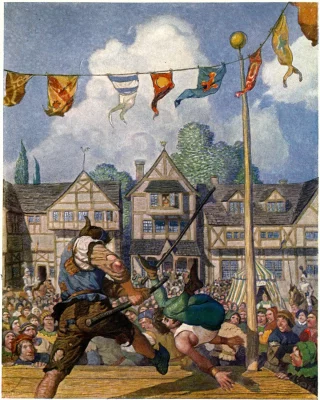
So, putting on the beggar’s clothes, the beggar was the gentleman, and Robin Hood was the beggar, who, entering into Nottingham town with his patched coat and several wallets, understood that three brethren were that day to suffer at the gallows, being condemned for killing the king’s deer, he made no more ado, but went directly to the sheriff’s house, where a young gentleman, seeing him to stand at the door, demanded of him what he would have. Robin Hood returned answer that he came to crave neither meat nor drink, but the lives of these three brothers who were condemned to die. “That cannot be,” said the young gentleman, “for they are all this day to suffer according to law, for stealing of the king’s deer, and they are already conveyed out of the town to the place of execution.” “I will be with them presently,” said Robin Hood, and coming to the gallows he found many making great lamentation for them. Robin Hood did comfort them, and assured them they should not die; and blowing his horn, behold on a sudden a hundred brave archers came unto him, by whose help, having released the prisoners, and killed the, hangman, and hurt many of the sheriff’s officers, they took those who were condemned to die for killing the king’s deer along with them, who, being very thankful for the preservation of their lives, became afterwards of the yeomanry of Robin Hood.
ROBIN HOOD AND KING RICHARD.
Now King Richard, hearing of the deeds of Robin Hood and his men, wondered much at them, and desired greatly himself to see him, and his men as well. So he with a dozen of his lords rode to Nottingham town and there took up his abode. And being at Nottingham, the king one day with his lords put on friars’ gowns every one, and rode forth from Fountain Abbey down to Barnsdale. And as they were riding there they saw Robin Hood and all his band standing ready to assail them. The king, being taller than the rest, was thought by Robin to be the abbot. So he made up to him, and seized his horse by the head, and bade him stand. “For,” said he, “it is against such knaves as you that I am bound to make war.” “But,” said the king himself, “we are messengers from the king, who is but a little away, waiting to speak with you.” “God save the king,” said Robin Hood, “and all his well-wishers. And accursed be every one who may deny his sovereignty.” “You are cursing yourself,” said the king, “for you are a traitor.” “Now,” said Robin Hood, “if you were not the king’s messenger, I would make you rue that word of yours. I am as true a man to the king as lives. And I never yet injured any honest man and true, but only those who make their living by stealing from others. I have never in my life harmed either husbandman or huntsman. But my chief spite lies against the clergy, who have in these days great power. But I am right glad to have met you here. Come with me, and you shall taste our greenwood cheer.” But the king and his lords marvelled, wondering what kind of cheer Robin might provide for them. And Robin took the king’s horse by the head, and led him towards his tent. “It is because thou comest from the king,” said he, “that I use you in this wise; and hadst thou as much gold as ever I had, it should be all of it safe for good King Richard’s sake.” And with that he took out his horn, and blew on it a loud blast. And thereat came marching forth from the wood five score and ten of Robin’s followers, and each one bent the knee before Robin Hood. “Surely,” thought the king, “it is a goodly sight to see; for they are more humble to their master than my servants are to me, Here may the court learn something from the greenwood.” And here they laid a dinner for the king and his lords, and the king swore that he had never feasted better. Then Robin Hood, taking a can of ale, said, “Let us now begin, each man with his can. Here’s a health to the king.” And they all drank the health to the king, the king himself, as well as another.
And after the dinner they all took their bows, and showed the king such archery that the king said he had never seen such men as they in any foreign land. And then said the king to Robin Hood, “If I could get thee a pardon from King Richard, wouldst thou serve the king well in everything?” “Yes, with all my heart,” said Robin. And so said all his men.
And with that the king declared himself to them, and said, “I am the king, your sovereign, that is now before you.” And at this Robin and all his men fell down on their knees; but the king raised them up, saying to them that he pardoned each one of them, and that they should every one of them be in his service. So the king returned to Nottingham, and with him returned Robin Hood and his men, to the great joy of the townspeople, whom they had for a long time sorely vexed.
"And they are gone to London court,
Robin Hood and all his train;
He once was there a noble peer,
And now he's there again."
THE DEATH OF ROBIN HOOD.
But Robin Hood returned to Sherwood Forest, and there met his death. For one day, being wounded in a fight, he fled out of the battle with Little John. And being at some distance, Robin Hood said to his lieutenant, “Now truly I cannot shoot even one shot more, for the arrows will not fly. For I am sore wounded. So I will go to my cousin, the abbess, who dwelt near here in Kirkley Hall, and she shall bleed me, that I may be well again.” So Robin Hood left Little John, and he went his way to Kirkley; and reaching the Hall, his strength nearly left him, yet he knocked heavily at the door. And his cousin came down first to let him in. And when she saw him she knew that it was her cousin Robin Hood, and she received him with a joyful face. Then said Robin, “You see me, my cousin, how weak I am. Therefore I pray you to bleed me, that I may be whole again.” And his cousin took him by the hand, and led him into an upper room, and laid him on a bed, and she bled him. But the treacherous woman tied not up the vein again, but left him so that his life began to flow from him. And he, finding his strength leaving him, thought to escape; but he could not, for the door was locked, and the casement window was so high that he might not leap down from it. Then, knowing that he must die, he reached forth his hand to his bugle horn, which lay by him on the bed.

And he got up and ran to Kirkley Hall as fast as he might. And coming to the door, he found it locked; but he broke it down, and so came to Robin Hood. And coming to the bed, he fell upon his knees, and said, “Master, I beg a boon of thee,- that thou lettest me burn down Kirkley Hall and all the nunnery.” “Nay,” quoth Robin Hood; “nay, I cannot grant you your boon; for never in my life did I hurt woman, or man in woman’s company, nor shall it be done when I die. But for me, give me my long bow, and I will let fly an arrow, and where you shall find the arrow, there bury me. And make my grave long and broad, that I may rest easily; and place my head upon a green sod, and place my bow at my side.” And these words Little John readily promised him, so that Robin Hood was pleased. And they buried him as he had asked, an arrow-shot from Kirkley Hall.
THE END
Source: The age of chivalry; by Thomas Bulfinch (1796-1867); Edward Everett Hale (1822-1909). Boston, S. W. Tilton & co. [etc.]; New York, C. T. Dillingham, 1884.
Discover more from World4 Costume Culture History
Subscribe to get the latest posts sent to your email.


